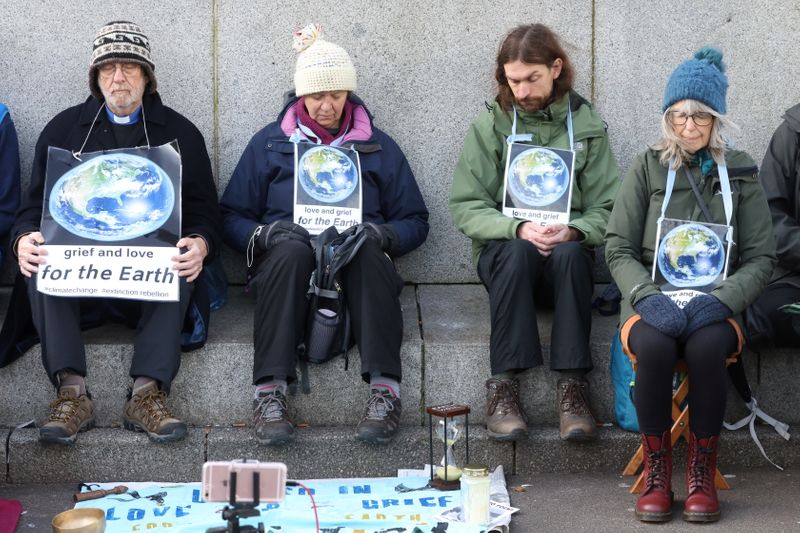By Mark John, Simon Jessop and William James
GLASGOW (Reuters) - Behind the headlines touting new emissions and finance commitments, the U.N. climate talks in Glasgow are facing a battle for credibility.
Over the last week, rich countries were accused of repeatedly breaking promises. Big polluters traded barbs. And environmental campaigners have cried betrayal, as years of U.N. climate negotiations to rein in climate-warming carbon emissions and protect the world’s most vulnerable have had little effect.
"We have not seen sincerity in the commitments and progress made by developed countries, and have heard far more slogans than practical results," Chinese delegate Gao Xiang wrote in Saturday’s official Shanghai newspaper, Guangming Daily.
Emissions are rising, and global temperatures – already 1.1 degree Celsius higher on average than in pre-industrial times – continue to climb. Rich nations that failed to meet a 2020 deadline to extend $100 billion a year in climate finance to poorer nations now say they won't meet that pledge until 2023.
Activists have dismissed the first week’s fanfare as “greenwashing,” even as country delegates and U.N. negotiators are still working on the details for implementing old and new promises.
But with the history of climate diplomacy littered with broken promises, many have asked: what needs to change beyond this year’s two-week conference to ensure accountability?
TIGHTEN THE RATCHET
Negotiators from nearly 200 countries return to the COP26 table on Monday, with just five days left to cut deals needed to cap global warming at 1.5 C - the limit beyond which the world will be courting devastating climate change impacts.
Among the big issues to resolve are: setting reliable rules for carbon markets, assessing how industrialized countries should pay for climate-linked losses incurred by the rest of the world, and working out financing to help developing countries adapt.
But one idea has gained traction: making countries review and, if necessary, update their emissions-cutting pledges every year, rather than on the current five-year schedule.
"It's an emergency. Every five years? That's not treating it like an emergency," said Saleemul Huq, advisor to the 48-country Climate Vulnerable Forum, which began lobbying for more frequent reviews before the Glasgow talks even began.
U.N. Secretary-General Antonio Guterres told delegates last week that, if COP26 fell short, countries should be required to revisit their climate plans every year.
U.S. climate envoy John Kerry also backed more regular reviews.
"I hope we come out with a very good framework. Whether it's five years (or) less, I can't tell you today," Kerry told journalists Friday. "But I definitely believe it should be as short as we can."
Supporters say such a change is crucial. With just 10 years left to bring global emissions down by 45%, which scientists say is vital to keeping the temperature rise in check, countries must be held accountable on an annual basis, they say.
"It would be negative in my mind to come out of here with too long a horizon," Kerry said.
CAPACITY CHALLENGE
For poorer countries with limited government capacity, an annual initiative could prove a strain.
"One year is too short," said Chioma Felistas Amudi, the assistant chief scientific officer in the climate change department of Nigeria’s Ministry of Environment.
She said many of country pledges, called Nationally Determined Contributions (NDCs), spanned a wide range of policy areas, energy plans, and government initiatives that needed both political will and financial backing.
"So a one-year check-in would disrupt the process of implementation," she said. "Five years gives us broader time to implement, and also do the stock-take."
Britain's environment minister questioned whether formal changes to the U.N. process were needed, saying it was already designed for incremental progress.

"I am not sure whether the technicality around a ratchet is something that we would push for or would be in the final text" this year, Environment Minister George Eustice told Times Radio. But he didn't rule it out.
"When you have these annual events ... there is a lot of referring back to previous agreements."